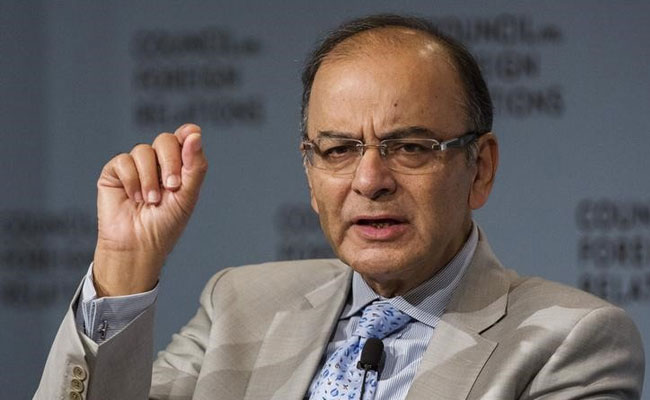NEW DELHI: Finance Minister Arun Jaitley today described India’s biggest-ever note ban a year ago as a watershed moment in the country’s economic history, saying it has provided the next generation with a fair and honest system to live in.
On the eve of the first anniversary of the decision to invalidate 86 per cent of the currency in circulation, Jaitley said the move has met its objective of reducing cash in the economy, ending anonymity of cash, bringing in more individuals in the tax net and dealing a body blow to black money.
In a 1,843 word blog, ‘A Year After Demonetisation’, he said that November 8, 2016 “signifies the resolve of this Government to cure the country from ‘dreaded disease of black money’.”
“November 8, 2016 would be remembered as a watershed moment in the history of Indian economy,” he said. “In an overall analysis, it would not be wrong to say that country has moved on to a much cleaner, transparent and honest financial system.”
The benefits may not yet be visible to some people, he said, adding that the next generation will view the post- November, 2016 economic development with a great sense of pride as it has provided them a fair and honest system to live in.
Prime Minister Narendra Modi had on November 8 last year announced the demonetisation of old Rs 500 and Rs 1,000 notes to combat corruption, black money, terrorism and fake currency.
Of the Rs 15.44 lakh crore worth of notes withdrawn from the circulation, Rs 15.28 lakh crore had been deposited back as on June 30, 2017. Currency worth Rs 17.77 lakh crore was in circulation on November 8 last year.
Jaitley said that post the note ban, the currency in circulation is less by Rs 3.89 lakh crore, which has met the objective of less cash economy so as to reduce the flow of black money in the system.
“With the return of Rs 15.28 lakh crore in the formal banking system, almost entire cash holding of the economy now has an address. It is no more anonymous,” he said, adding that from this inflow, the suspicious transactions under the radar range from Rs 1.6 lakh crore to Rs 1.7 lakh crore.
The tax administration and other enforcement agencies are using big data analytics to crack down on suspicious transactions, he said.
Undisclosed income admitted and detected, taken together, amounts to Rs 29,213 crore, which is close to 18 per cent of the amount involved in suspicious transactions, he said.
Also, he added, the removal of anonymity with currency has led to 56 lakh new individual tax payers filing returns this year till August 5, self-assessment tax (voluntary payment by tax payers at the time of filing return) paid by non-corporate entities increased by 34.25 per cent.
With increase in tax base and bringing back undisclosed income into the formal economy, the amount of Advance Tax paid by non-corporate tax payers during the current year has also increased by about 42 per cent, Jaitley said.
“The leads gathered due to data collected during demonetisation period have led to identification of 2.97 lakh suspect shell companies,” he said, adding that 2.24 lakh companies have been de-registered.
Further actions were taken to stop operations of bank accounts of these struck off companies. Actions are also being taken for freezing their bank accounts and debarring their directors from being on board of any company.
Jaitley said that out of the struck off companies, 28,088 had deposited and withdrawn Rs 10,200 crore from 49,910 bank accounts from November 9, 2016 till the date of being struck off.
Simultaneously, Income Tax Department has taken action against more than 1,150 shell companies which were used as conduits by over 22,000 beneficiaries to launder more than Rs 13,300 crore.
Also, SEBI has introduced a Graded Surveillance Measure at stock exchanges.
The Finance Minister said demonetisation appears to have led to an acceleration in the financialisation of savings.
“In parallel, there is a shift towards greater formalisation of the economy in the near term aided by the introduction of Good and Services Tax (GST),” he said.
Jaitley said demonetisation also led to a big leap in digital payments. As many as 110 crore transactions, valued at around Rs 3.3 lakh crore — and another 240 crore transactions, valued at Rs 3.3 lakh crore — were carried out through credit cards and debit cards respectively.
The value of transactions for debit and credit cards, in contrast, was Rs 1.6 lakh crore and Rs 2.4 lakh crore respectively during 2015-16.
The value of transactions with pre-paid instruments has also increased.
With higher level of formalisation, workers have got social security benefits as reflected in large increase in opening of bank accounts for workers, enrolment in EPF and ESIC.
“The reduction in incidences of stone pelting, protests in J&K and naxal activities in LWE affected districts are also attributed to the impact of demonetisation as these miscreants have run out of cash,” he said. “Their access to fake Indian Currency Note (FICN) was also restricted.” (AGENCIES)
Trending Now
E-Paper


